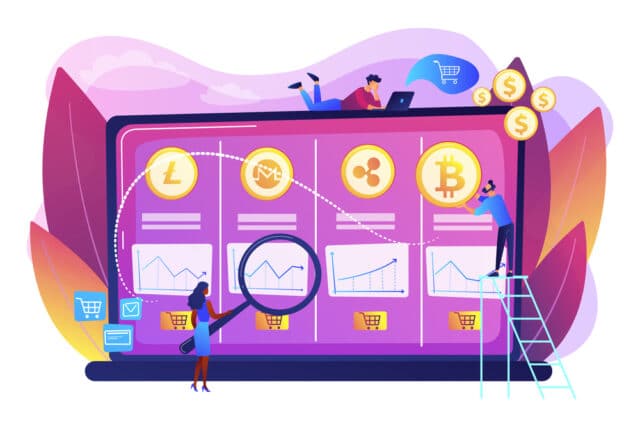Cryptocurrencies have changed the way we think about money and the financial world. Since their introduction, crypto futures have arguably been one of the most interesting trading instruments. They’ve fuelled an extra-industry interest in the cryptocurrency area by permitting speculative exposure, broadening its general appeal, and promoting adoption.
Cryptocurrency futures enable you to enhance your profits by utilizing the power of leverage and employing smart trading tactics. By using futures, investors speculate on market direction and reduce risk while holding less cryptocurrency than on a spot exchange.
What is crypto futures trading?
Crypto futures differ from spot trading in that it does not require participants to own any assets. Rather, it allows investors to speculate on a cryptocurrency’s future value. Traders might go long to bet on a price rise or short to bet on a price fall. The utilization of leverage is one of the essential advantages.
Because traders do not have to lock up entire quantities of capital, leverage allows for higher capital efficiency. It raises the possible gains as well as the losses, which is why traders must constantly be cautious.
For newbies, leverage of 2x or 5x might be ideal. This is especially for traders that aim to employ crypto derivatives as a protective hedge for their portfolios. If an asset performs poorly or in the opposite direction of what is expected, a futures contract hedged against this outcome and leveraged to a certain extent can compensate for the loss.
How do crypto futures work?
You’ll need to find a broker or exchange that offers futures trading if you want to get started. Many online discount brokers sell crypto futures to clients because they are available on regulated exchanges like the CME. Unregulated exchanges such as Kraken also offer crypto futures trading. Unregulated exchanges involve more risks, but they also provide more leverage and a wider range of cryptocurrencies to trade.
Regulated exchange
Let’s say an investor buys two Ethereum futures contracts for a total of ten ETH. When the futures contracts were purchased, a single ETH cost $3,000 each, thus a total of $30,000 for both futures contracts. Say the margin requirement for Ethereum futures on the exchange is 60% of the contract value; the investor will need to deposit $18,000 as a margin. They can use leverage to fund the remainder of the contract purchase.
The investor can either keep the futures contracts or sell them to another party, depending on the price of Ethereum. At the end of their contracts’ duration, the investor has the choice either to roll them over to new ones or to let them expire and acquire the payout due.
Unregulated exchange
Traders can use leverage here. Keep in mind that increased leverage means more volatility in your trade. As a result, the potential for huge earnings is counterbalanced by the danger of significant financial loss. The leverage rates differ significantly between platforms. The amount you can trade is determined by the amount of margin you have available. The bigger the trade’s value, the more margin the broker or exchange will require to complete the transaction.
Advantages
Hedge price risk
Investors who hold digital assets might reduce the risk of a price drop by taking a “short” future position on the asset at the same time. If the price decreases, the “short” position will compensate for the loss by bringing in more money.
Simplicity
Because there is no physical cryptocurrency exchange, the investor does not need to create a wallet or place money into custody solutions for safekeeping and security while trading. Cash-settled contracts benefit from removing the risk of physical ownership of a risky item.
Speculate on the market’s future direction
It allows for actual speculation because traders can use futures contracts to make their thoughts known in the market. If they believe the value of crypto will skyrocket, they increase their returns by going long on futures. On the other hand, if they believe it will decline, they go short on futures.
Leverage
Margin allows derivatives traders to control enormous bets with a little amount of money. Cryptocurrencies are already risky, but crypto futures on unregulated exchanges like Binance can have leverage as high as 100-to-1.
It is flexible
Institutional money managers are frequently unable to trade on unregulated exchanges or invest in digital currencies. Crypto futures, on the other hand, are contracts traded on regulated exchanges, so institutional investors and asset managers won’t go afoul of their compliance teams.
Disadvantages
Compounding losses
Leverage allows for profits that far outsize the original investment. But it is a two-way street. If you use too much leverage and your transaction goes bad, you might lose the majority, or all, of your money rapidly.
Forced liquidations
Because a futures market lacks a central clearing party, margins must be maintained, or exchanges will liquidate positions. If you liquidate for a profit, the money goes into the exchange’s insurance fund, which shields you from counterparty risk. As more and more large positions are closed off, liquidations can have a cascade effect, causing more market drops.
Different prices on unregulated exchanges
Unregulated exchanges may appeal to crypto traders, but because there is no centralized price mechanism, they might cause market distortions. Ethereum’s price on one exchange may differ from that on another, causing serious problems for futures traders.
Summary
Cryptocurrency futures contracts may be a viable alternative if you want to trade but won’t need to use cryptocurrencies as a payment method. You won’t even need to create a digital wallet or have a safe address. It can be done in both regulated and unregulated exchanges. Leverage is provided through futures contracts. However, highly volatile products like bitcoin limit the amount of leverage available. Like any other type of trading, futures have advantages and disadvantages.




